| Author | Message | ||
ross kowalski Prolific User Username: cdfpw Post Number: 1405 Registered: 11-2015 |
If you ever get gel in you float bowl the problem is ethanol. Ethanol actually isn't too bad if it is dry but once it leaves the refinery it comes into contact with water. If you are curious, here's what the gel actually is... https://www.scielo.br/pdf/mr/v21n6/1516-1439-mr-21-06-e20170272.pdf https://info.ornl.gov/sites/publications/Files/Pub42125.pdf I am sure actual problem is a lot more complicated than this article gets to as I assume there are electrolytic issues as well as lots more chemicals involved. I am pretty sure the HD8 SU is zinc but I wonder if there are any aluminum components in the fuel system? FYI, In looking this up I found some nonsense by some ethanol fanboy (who won't get coverage here) which "dismissed the myths about ethanol" I couldn't finish reading it as it was complete rubbish. | ||
Patrick Ryan Grand Master Username: patrick_r Post Number: 2268 Registered: 04-2016 |
Great research there Ross. Yep, Gotta love a good fan boy (regardless of topic or subject) They are just single minded and blind to anything & everything against their beliefs. Hmmmm?? Isnít there another word for that type of person? | ||
Brian Vogel Grand Master Username: guyslp Post Number: 3046 Registered: 06-2009 |
Well, I'll plead guilty to be what many would call an ethanol fanboy. Virtually everything posted about it calling it a demon substance doesn't hold up to even cursory examination. References from myself, and others, in the previous topic, Ethanol Blend Fuel The death of cars from ethanol in fuel (and, previously, unleaded fuel), the ZDDP fixation, and fear of most modern coolant formulations are all equally misplaced and do not hold up to scrutiny, and the more intense the scrutiny the more ridiculous they are revealed as being. Brian | ||
ross kowalski Prolific User Username: cdfpw Post Number: 1406 Registered: 11-2015 |
Brian, Chicken littleing is a thing, no question. CAFE standards didn't end high horsepower cars. Unleaded gasoline didn't destroy all iron seat engines. Engine management systems didn't end engine turnig. On the other hand Ethanol... that's a different story. It isn't a problem in modern cars engineered to work with it. It certainly is a problem in engines with aluminum fuel syetem components. It's such a problem in small engines with AL carb bodies that it's almost a running joke. "Your engine is starving for fuel and you drained the bowl and added fresh gas and it still isn't getting fuel" "I'm going to go out on a limb here but there is gel plugging the fuel inlet to the main jet and the main jet itself" Ethanol lowers you fuel economy but in E10 it's not usually enough to cause anyone concern. Ethanol does seperate from gas when "wet" and the gasoline sits on top because it is lighter. If you have a low tank pick up, you fill the gas line with the ethanol water mix shortly after starting. Ethanol is corrosive to metal. Especially where there are disimilar metals one of which is AL. A mower with an AL body carb and a steel float bowl . I don't have problems with the gas equipment beacuse I stopped leaving fuel in vehicles and I run the gas out of the carbs for storage. | ||
David Gore Moderator Username: david_gore Post Number: 3704 Registered: 04-2003 |
Easy solution if you don't like E10 - buy a diesel engined car. Get better performance, better fuel economy and better long-term engine life. My car fleet is now a diesel Mazda CX5, a diesel VW Eos convertible and my indestructible low running cost diesel Toyota 4Runner [Surf in the USA]. | ||
ross kowalski Prolific User Username: cdfpw Post Number: 1407 Registered: 11-2015 |
David, Hear hear. In the USA the choices for oil burning cars were limited and with the VW scandal are now almost non-existent. Of course with electric cars coming down in price they will likely never market diesel cars here again. | ||
Brian Vogel Grand Master Username: guyslp Post Number: 3047 Registered: 06-2009 |
Anyone should buy the products that suit them best. The 4Runner is definitely still for sale in the USA, but not as a diesel. Have never heard of a Toyota Surf. Like Ross, I have my doubts as to whether diesel vehicles for non-commercial use will ever gain a foothold in the USA again. But, circling back, gasoline with 10% ethanol has been virtually the only thing available anywhere in the USA since the 1980s. When I see gasoline powered automobiles, farm equipment, lawn and garden equipment, of all ages failing en masse I'll believe there's a substantial problem. Since we're 40 years in, and it never did happen, I'm not holding my breath. Reports of "demon ethanol" have been greatly exaggerated. The document from ORNL notes, very early on, "Commercially pure wrought aluminum and several cast aluminum alloys were observed to be similarly susceptible to substantial corrosion in dry (< 50 ppm water) ethanol. Corrosion rates of all the aluminum materials examined were accelerated by increased temperature and ethanol content in the fuel mixture, but inhibited by increased water content. Pretreatments designed to stabilize passive films on aluminum increased the incubation time for onset of corrosion, suggesting film stability is a significant factor in the mechanism of corrosion." Those are some pretty important data points, particularly the water content note. I seldom see polished metal components except among the "racer set" and even then those are chromed. And most aluminum I see in car parts is clearly treated to have what looks like a corrosion film (whether it's actually corrosion or not) as a feature of the new surface. Anyway, I really do need to drop out on this, and probably should have before writing the above. There is enough data out there, and that's been presented by "the sides" here, such that anyone can read up and make up their own minds about how concerning ethanol in fuel should be to them. You do your research and follow the path you feel is right for you. Brian | ||
David Gore Moderator Username: david_gore Post Number: 3705 Registered: 04-2003 |
Brian, I was mainly referring to the US pre-2000 models which I understand were sold in California as the Toyota Surf [as this was the name in Japan] to attract sales from US surf board enthusiasts who found this vehicle was ideal for accessing hard-to-get-to-beaches due to its size, high-low range 4WD and low running costs. https://en.wikipedia.org/wiki/Toyota_4Runner Some used Japanese RHD Surf vehicles were imported here after Toyota replaced the Australian 4Runner models with the larger, heavier and more expensive [approx. AUD 10K/15K] Toyota Prado in the late 1990's/early 2000's. Even today, used Toyota 4Runners are eagerly sought and bring good prices due to their endurance and versatility. I have a 1993 manual diesel 4Runner with almost 600,000km on the clock as my property maintenance vehicle as it meets all my needs for carrying tools, building materials and towing a trailer. It's size is ideal for city use and "bush-bashing" as it can get in and out of tight spaces that stop the larger Prado and Landcruiser 4WD "tanks". Big marketing mistake for Toyota IMHO . | ||
ross kowalski Prolific User Username: cdfpw Post Number: 1408 Registered: 11-2015 |
Brian and David, Diesel had a chicken little moment a while back in the USA. With ULS Diesel people thought all pumps were going to fail. Some did, but because everyone runs Power Service Additive that was w non issue. Brian, I wasn't looking up ethanol corrosion in fuel systems to see if it happens, I just wanted to know what the chemical composition of the gel is. The problems didn't happen en masse except they did. The auto industry spent millions to make fuel systems compatible with ethanol. The boating, hotrod, small engine, car collection, aviation people all across the country have spent untold hours doing special servicing and repairs related to this additive. People who remember MBTE days and before know when gel plugged fuel systems started and that came with the change to our friend ethanol. I just wonder if there is any AL in the RR fuel system. | ||
Mark Aldridge Frequent User Username: mark_aldridge Post Number: 680 Registered: 10-2008 |
Ross, Cloud series have aluminium fuel tank Mark | ||
ross kowalski Prolific User Username: cdfpw Post Number: 1409 Registered: 11-2015 |
Mark, That would make me nervous. I would be extra sure to keep the fuel fresh in that ( plus additives ). | ||
Brian Vogel Grand Master Username: guyslp Post Number: 3048 Registered: 06-2009 |
And I'd suggest consulting with Cloud/S owners who live in countries where 10% ethanol has been in fuel for decades to see what special measures, if any, they've been taking, and what issues, if any, have occurred. The number of Cloud owners in the RROC-US is quite large and there are several (2, maybe 3)Clouds and one S3 in my town. I know the owner of the S3 pretty well, and I know she's never done anything other than cruising into the gas station like everyone else when needing fuel. There's nothing like the voices of experience to collect hard data. And we will never have statistically valid sample sizes (except, perhaps, for SY series owners, and probably not even then). Brian | ||
Patrick Lockyer. Grand Master Username: pat_lockyer Post Number: 2314 Registered: 09-2004 |
I have no probs with all the failings of the petrol of todays formulas, the Shadows etc running LPG IMO. LPG has many benefits also not leaving an emission trail behind them causing health problems with for the next generations. | ||
Patrick Lockyer. Grand Master Username: pat_lockyer Post Number: 2315 Registered: 09-2004 |
As for use of E10 in RR motors they only advise its use in cars manufactured after 2003. Here in the UK E5 is causing all sorts of failings with fuel systems not always in regular use. https://www.acea.be/uploads/publications/ACEA_E10_compatibility.pdf Rather than some folk who try to recommend using the stuff they should start to use there laid up cars and see for themselves what real crap the stuff is. | ||
Brian Vogel Grand Master Username: guyslp Post Number: 3049 Registered: 06-2009 |
I find it laughable that anyone, regardless of their opinion on ethanol, believes that most manufacturers are going to make any official statement about really old cars and compatibility with modern fuels, and that means those without ethanol, too. The gasoline today is so radically different from the gasoline of, say, 1980 or earlier, that it's impossible to say "they're the same" whether ethanol is involved or not. This is true of motor oil, too. But when I have the leading engineering bodies in the world telling me, repeatedly, that the latest fuels and motor oils are suitable for use in older vehicles, and these were the very bodies that decided have always been in charge of making these determinations, I'll believe them. I do not "know better" than the SAE, ILSAC, and all the entities I referenced in the topic I gave the link to on ethanol in fuel I (and others) gave earlier. The experts do know better than I do, and that's why I turn to them. My now 30 plus years of using E10 almost exclusively, in many vehicles that preceded its introduction for the first 10 of those, and in my RR cars since getting into the hobby is congruent with what the experts say. If you're still driving a vehicle that has "true rubber" (which wasn't really) fuel lines then attributing their failure exclusively to "demon ethaol" is, quite simply, stupid. Marine vehicle fuel tanks up until recently could not tolerate ethanol secondary to the sealing materials used, not the tank material. Airplane fuel (avgas) still doesn't have ethanol in it due to issues with ethanol at altitude, in an environment very, very different than on the road. But we're talking about cars, mostly, and small equipment that generally runs just fine with ethanol in fuel with the rarest of exceptions. Just like I don't worry that I'll be killed by a meteorite when I step outside my door because the probability is infinitesimally small, I don't worry about older cars not tolerating E10 because they have been, for decades, here in the USA. There has never been even a cottage industry that surrounded fixing/upgrading for ethanol compatibility, and there's a reason for that. These are opinions based on verifiable fact, expert opinion, and life experience. What happened to "cousin Joe's cousin Sam" and his claims about ethanol being the cause are entirely discountable. Brian | ||
David Gore Moderator Username: david_gore Post Number: 3707 Registered: 04-2003 |
Brian, One question very applicable to RR/B vehicles to which this forum is dedicated: Why did Burlen find it necessary to assemble and market replacement part kits for SU fuel pumps and carburettors fitted to vehicles prior to the introduction of E10 fuel? Why did RRMC not advise E10 as being suitable for their motor cars manufactured prior to the introduction of E10 and then further delayed this advice until E10-compatible components were being fitted to new vehicles in production? IMHO this would not have been necessary if there had been no problems with E10. | ||
Brian Vogel Grand Master Username: guyslp Post Number: 3051 Registered: 06-2009 |
David, I can't go on with this anymore. I suggest that the actual content of those kits be listed. As I've already mentioned, there can be issues with seals and hoses, but they're not of a catastrophic failure in short order nature, and most of these items get replaced over the years as a matter of course. Most of those replacements were done long ago, either if problems occurred (and they often didn't) or as part of routine maintenance. Elastomers now long, long, long out of production, which were used, had problems of slow degradation with E10, a fact which I will not deny. But cars (whether RR/Bentley or others from the era where those elastomers were in common use) were not dying in massive numbers, and quickly, even way back when. By now, which is what we're talking about, unless a car is a barn find is is extremely unlikely that any part of a fuel system that was "rubber" of any sort was not long ago replaced, or should have been, even if the vehicle in question has never seen a drop of ethanol. I simply don't believe that cars used even semi-routinely, and particularly those owned by the persnickety, have not long ago had any and all fuel system components that could be affected negatively by ethanol replaced, sometimes more than once (and not due to the ethanol, as the first replacements were already OK for ethanol). This is a discussion that will never end. So I'll bow out, as I've made my position, and assumptions very clear. And if someone wishes to argue with those under the conditions noted, have at it, and provide references that show the bases for the objections. I'm just freakin' exhausted and I'm not changing my mind, and it appears the opposite side is not going to either. That leaves the reference material to be consulted and each individual to decide which holds weight. That is the answer to these controversies that just won't be settled. Brian | ||
Patrick Lockyer. Grand Master Username: pat_lockyer Post Number: 2316 Registered: 09-2004 |
Dare I believe !!!!!!!!!!!!!!!!! 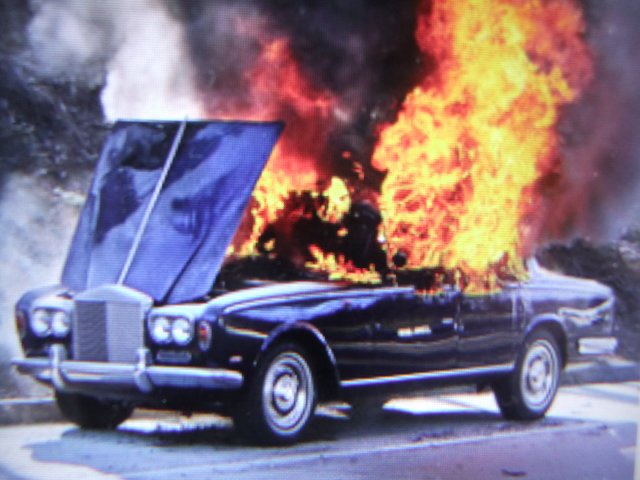 | ||
ross kowalski Prolific User Username: cdfpw Post Number: 1410 Registered: 11-2015 |
Brian, I had an AL bowl on my fuel filter which is the only thing I could think of in my car. I replaced it with a tillotson filter a while back so I guess I am no longer in the gel game. I'll try and get pictures the next time I am scooping goop out of some float bowl or filter on a non- runner. Payrick, LPG is hard to find in the USA. There is one station I can think of and it's 15 miles away. I am surprised how few converted classic cars are around. The fuel doesn't go bad in the tank, the carb remains dry, it's inexpensive, runs clean, and operates identical to petrol. The conversion itself is even easy. I converted my generator a while back which is easier because it's less than 13hp ( different regulations) but it was a total cake walk. | ||
ross kowalski Prolific User Username: cdfpw Post Number: 1411 Registered: 11-2015 |
Patrick, I saw that picture of your car burning. You can leave and open box of baking soda on the front seat and It will get the smoke smell out. I would suggest two. Brian, I think you hit it exactly in your last post there. "Used semi routinely" I suspect, use, weather, and fuel quality probably have a lot to do with the " blind men and the elephant" aspect to this. The guy touching the leg sees gel, the guy with the tail never has a problem, the guy with the ears takes his car in and has no idea what is done to keep his ride on the road. My whole point on this is it's the AL in the fuel system that turns out yo make the gel and if there is AL in a RR fuel system we should be suspect. | ||
Patrick Lockyer. Grand Master Username: pat_lockyer Post Number: 2317 Registered: 09-2004 |
Ross you hit the nail on the head with LPG, ticks all the boxes apart from all electric. If I live long enough with time to spare would love to do a RR to electric. | ||
Brian Vogel Grand Master Username: guyslp Post Number: 3052 Registered: 06-2009 |
Patrick Lockyer:
Believe what. That cars can and do burn, including those made by Rolls-Royce? Another non sequitur that has absolutely nothing to do with anything I said. But that's been your MO with regard to me for years, so color me unsurprised. Brian | ||
Trevor Hodgekinson Experienced User Username: wm20 Post Number: 178 Registered: 11-2006 |
I was ignoring this thread but it is time to add some sanity to it Ethanol in fuel is fine apart from the fact it has a lower energy level that strait fuel so you end up loosing money. so what has changed there. When unleaded came in the 2 sectors that researchd it most thououghly were the avaition industry & the marine industry. ULP was fine in boats but there was a problem with aircraft engines that fly above 10,000 feet when you start to run significantly leaner mixes. Like most things the findings were applied to situations that were not appicable, unless you drive your RR above 10,000 & have a mechanism for adjusting the air:fuel ratio on the fly. Thus avgas still has lead Same story for ethanol Again a problem in aeroplanes, particularly those that get used infrequently and also a problem for boats. Thus again no E10 at airports or marinas Once again no real problem with engines running in labs. However nearly all of them were modern fuel injected engines so the fuel was continiously being circulated through the system & returned to the fuel tank and also getting quite warm, thus the ethanol does no separate And no problems in cars that are used at least weekly. But engines that get used very infrequetly like RR club cars that might be lucky to see the road once a month, a big problem. AS previously mentioned I am currently repairing mowers & small engines. Pulling off a float bowl that is full of "custard" is a daily event The bowls get tossed because the water ethanol mix dissolves the zinc plating on steel bowls and thus they will then start to rust Most carbs come good with a hour or so in the ultrasonic cleaner but probably 10% are so corroded that they are beyond safe use. The ethanol fuel does not eat out the aluminium B & S fuel tanks any faster than plain old water seems to do but it seems to gobble up zinc like there is no tomorrow. So yes ethanol is a problem , in carburettored engines of cars that get used infrequently. It will corrode zinc faster than plain water will and in particular electrolytic corrosion in the presence of iron corrosion will be drastically accelerated. I do not know enough about the construction of RR fuel pumps or fuel tanks to proffer an opinion weather it will be a problem for them. And let us not forget climate & microclimate I doubt it would be a problem for those living in the arid inland or members with airconditioned garages. | ||
Mark Aldridge Frequent User Username: mark_aldridge Post Number: 682 Registered: 10-2008 |
Trevor, Do ethanol protection additives like Tetraboost or Millers VSPE work ? Mark | ||
Patrick Lockyer. Grand Master Username: pat_lockyer Post Number: 2323 Registered: 09-2004 |
No long term, snake additives. | ||
Trevor Hodgekinson Experienced User Username: wm20 Post Number: 180 Registered: 11-2006 |
I have no idea if any of them work However just about anything you put in your tank or oil is a waste of money. Simple rule If you use it regularly don't worry If you are a very occasional user pop an over ride switch on the fuel pump so you can turn it off and starve the engine off | ||
Larry Kavanagh Frequent User Username: shadow_11 Post Number: 643 Registered: 05-2016 |
Good idea Trevor, over ride switch for pump would also double as an anti-theft device. | ||
ross kowalski Prolific User Username: cdfpw Post Number: 1434 Registered: 11-2015 |
The cushman truckster only barely runs on full choke, oh whatever could it be. (said with full distain for ethanol related wastes of my time) 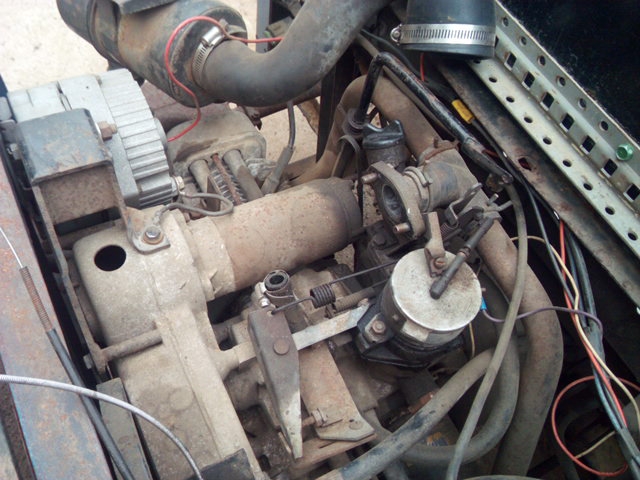 The carb is on the table saw getting the main jet cleaned. 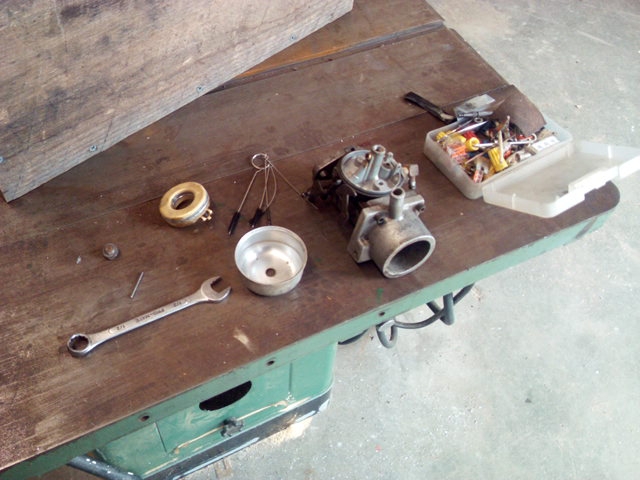 Here is a picture of some of the jelly curds in the float bowl. These are not the bad ones, the bad ones were in the main jet itself which nearly completely plugged it. 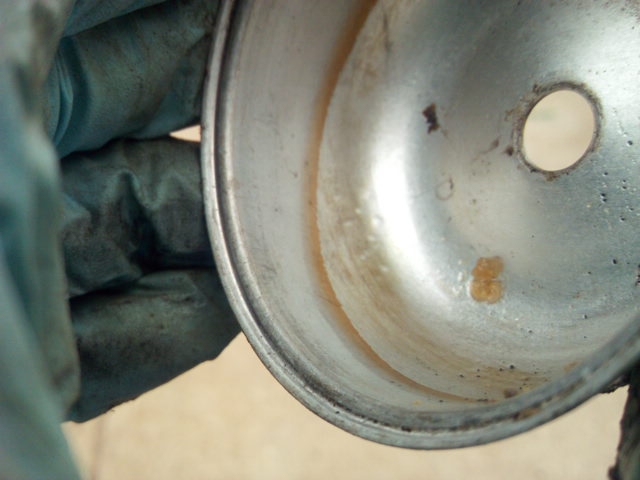 | ||
Trevor Hodgekinson Experienced User Username: wm20 Post Number: 182 Registered: 11-2006 |
Have never had a RR fuel tank out are they aluminium or Tern plate ? | ||
ross kowalski Prolific User Username: cdfpw Post Number: 1506 Registered: 11-2015 |
Bought a 7k generator today for 50 USD. Perfect condition but won't run. ( Patrick L, I need 5k but converting it to lpg means starting with something 25% over spec) Hmmmm, wonder what could be the trouble. 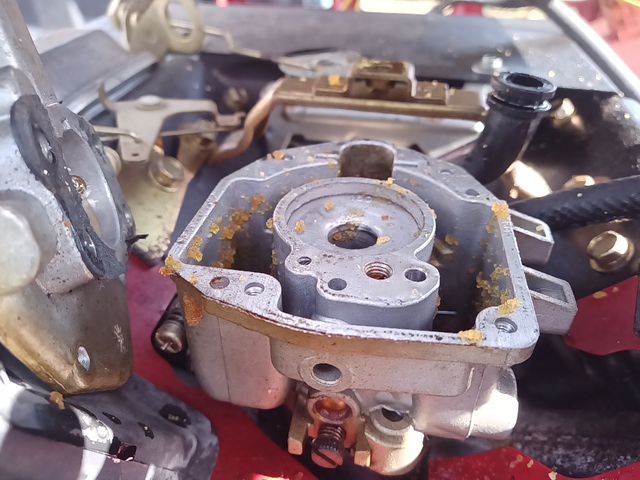 https://youtu.be/npVIRZ5BXrk | ||
David Gore Moderator Username: david_gore Post Number: 3805 Registered: 04-2003 |
Stale fuel from not using a fuel conditioner or leaving untreated fuel in the tank for a long time between use. I run my 6.5kva generator fuel tank dry after use and treat my stored fuel with Sta-Bil Fuel Stabiliser which has an effective life of several years: https://www.sta-bil.com.au/ I will not use fuel containing ethanol under any circumstances where long-term storage is involved. . | ||
Patrick Lockyer. Grand Master Username: pat_lockyer Post Number: 2382 Registered: 09-2004 |
Ross, the LPG route sounds good. Slightly down on power to petrol. My hobby workshop has some equipment that is 3 phase 415 volt compressor, tyre changer, wheel balancer so am running a 12.5KVA Lister Petter diesel generator. Will also run 240 volts if needed. Positioned in an out house because of the noise! Have you thought of a tractor pto driven generator! 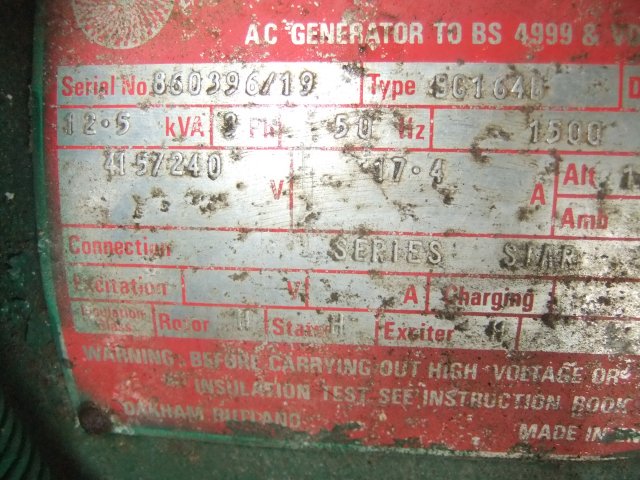   |